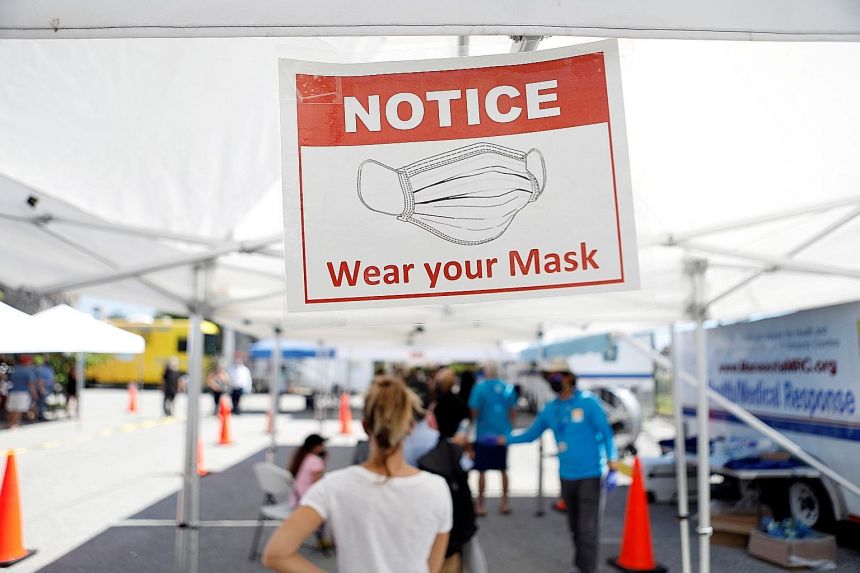News analysis
Covid-19: Mixed messaging hampering US fight against Delta variant
Sign up now: Get ST's newsletters delivered to your inbox

Almost six in 10 Americans say federal health agencies like the CDC have been giving mixed messages about coronavirus risk.
PHOTO: REUTERS
WASHINGTON - The White House and the Centres for Disease Control and Prevention (CDC) have over the past fortnight scrambled to update their messaging as new data on transmission of the Delta variant of the coronavirus emerges.
This has left the American public confused over apparent inconsistency.
Almost six in 10 Americans, or 59 per cent, say federal health agencies like the CDC have been giving mixed messages about coronavirus risks, according to a Monmouth University poll.
"Americans acknowledge that the CDC and other health agencies have to deal with a lot of uncertainty," Monmouth University Polling Institute director Patrick Murray said on Tuesday (Aug 3).
"Still, it is tough for the average person to understand the flip from masks being optional to being necessary again. The messaging has not been clear."
The mixed messaging reaches another level in Florida, a state hit very hard with hospitals filling up with children and young Covid-19 patients. As much as 23 per cent of all new Covid-19 hospitalisations in the country are in Florida.
The state's Republican Governor Ron de Santis has, however, flatly contradicted the federal government.
In the context of schools, for instance, he has said wearing masks obstructs breathing. It is parents, not the government, who should decide whether their children must wear masks in school, he insisted.
The result: Parents of schoolgoing children have no idea who to believe. School boards are scrambling to meet to decide what to do.
All this as the United States hit a six-month high for new Covid-19 cases, with more than 100,000 new cases of infections reported on Wednesday, according to a Reuters tally.
Cases are highest in areas - mostly Republican states - with high rates of unvaccinated people.
But breakthrough infections in the fully vaccinated are also being widely reported, though it is clear that being vaccinated saves one from the most serious effects of Covid-19; reportedly well over 90 per cent of those hospitalised are the unvaccinated.
The number of daily cases could double in the fall, Chief White House medical adviser, Dr Anthony Fauci, warned on Wednesday.
"I think you're likely going to wind up somewhere between 100,000 and 200,000 cases," he told McClatchy in an interview.
The CDC made a "grave mistake" in underestimating the Delta variant that is now driving cases globally, contends Dr Eric Feigl-Ding, epidemiologist and senior fellow at the Federation of American Scientists in Washington.
The World Health Organisation (WHO) declared the Delta variant a concern in early May, but it was not until a month later that the CDC did that, he said.
"It was an atrociously late declaration," Dr Feigl-Ding told The Straits Times.
He also blamed the media for missing nuances, saying there were "a lot of bad takes and half takes out there".
The New York Times, for instance - and others - last week tweeted that the Delta variant was "as contagious as chickenpox and may be spread by vaccinated people as easily as the unvaccinated".
Mr Ben Wakana, a member of the White House's rapid response team, responded to say vaccinated people do not transmit the virus at the same rate as the unvaccinated.
"If you fail to include that context, you're doing it wrong," he tweeted.
The CDC itself has been caught in a bind, "terrified" that it will inadvertently undermine faith in vaccination, an analyst in Washington who has been closely monitoring the pandemic told ST, asking not to be named.
On the one hand, the CDC must reassure the public that the vaccines are in fact safe, but on the other hand, they have to be as cautious as possible and also advise people that the vaccine is not a get-out-of-jail-free card, the analyst said.

<p>A COVID-19 vaccination site at Louisiana State University in Baton Rouge on Tuesday, Aug. 3, 2021. Thirty-seven percent of Louisiana residents are fully vaccinated, below the countryÕs rate of almost 50 percent. (Emily Kask/The New York Times)</p>
PHOTO: NYTNS
"It's clear that science often changes," Dr Feigl-Ding told ST. "It's like we have more data. Then when you say, 'Science often changes', people say, 'oh, is someone fudging the data?'"
"I think what we need to be clear is that the science is updated with more information. Especially with the new variant, the science is very different - because it's a new variant," he said.
"Where sometimes we're not sure, one should take the more precautionary route," he said.
"And some people just don't do that, they say well we don't know for sure, so I'm not going to do that. Even though maybe they should, because in certain ways, if you take the non-precautionary approach and you're wrong, people die."


